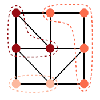A cutting-plane method for contiguity-constrained spatial aggregation
Keywords:
area aggregation, districting, spatial unit allocation, optimization, integer linear programming, cutting-plane method, map generalization, choropleth mapAbstract
Aggregating areas into larger regions is a common problem in spatial planning, geographic information science, and cartography. The aim can be to group administrative areal units into electoral districts or sales territories, in which case the problem is known as districting. In other cases, area aggregation is seen as a generalization or visualization task, which aims to reveal spatial patterns in geographic data. Despite these different motivations, the heart of the problem is the same: given a planar partition, one wants to aggregate several elements of this partition to regions. These often must have or exceed a particular size, be homogeneous with respect to some attribute, contiguous, and geometrically compact. Even simple problem variants are known to be NP-hard, meaning that there is no reasonable hope for an efficient exact algorithm. Nevertheless, the problem has been attacked with heuristic and exact methods. In this article we present a new exact method for area aggregation and compare it with a state-of-the-art method for the same problem. Our method results in a substantial decrease of the running time and, in particular, allowed us to solve certain instances that the existing method could not solve within five days. Both our new method and the existing method use integer linear programming, which allows existing problem solvers to be applied. Other than the existing method, however, our method employs a cutting-plane method, which is an advanced constraint-handling approach. We discuss this approach in detail and present its application to the aggregation of areas in choropleth maps.

Downloads
Published
Issue
Section
License
Copyright (c) 2017 Johannes Oehrlein, Jan-Henrik Haunert

This work is licensed under a Creative Commons Attribution 4.0 International License.
Articles in JOSIS are licensed under a Creative Commons Attribution 3.0 License.
